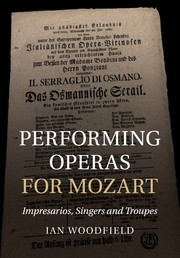Book contents
- Frontmatter
- Contents
- Illustrations
- Figures
- Tables
- Musical examples
- Abbreviations
- Introduction
- 1 Pasquale Bondini
- 2 Die Entführung aus dem Serail
- 3 The Italian troupe in Prague
- 4 The Prague Figaro
- 5 The genesis of Don Giovanni
- 6 The première of Don Giovanni
- 7 The casting of Don Giovanni
- 8 The Leipzig Don Giovanni
- 9 The 1788 Prague Don Giovanni
- 10 Mozart’s music in Leipzig
- 11 Josepha Duschek’s academy (22 April 1788)
- 12 Mozart’s academy (12 May 1789)
- 13 Guardasoni in Warsaw
- 14 The première of La clemenza di Tito
- 15 The Leipzig reception of the Da Ponte operas (1792–1794)
- 16 Guardasoni diversifies
- Conclusion
- Appendices
- Bibliography
- Index
9 - The 1788 Prague Don Giovanni
Published online by Cambridge University Press: 05 January 2012
- Frontmatter
- Contents
- Illustrations
- Figures
- Tables
- Musical examples
- Abbreviations
- Introduction
- 1 Pasquale Bondini
- 2 Die Entführung aus dem Serail
- 3 The Italian troupe in Prague
- 4 The Prague Figaro
- 5 The genesis of Don Giovanni
- 6 The première of Don Giovanni
- 7 The casting of Don Giovanni
- 8 The Leipzig Don Giovanni
- 9 The 1788 Prague Don Giovanni
- 10 Mozart’s music in Leipzig
- 11 Josepha Duschek’s academy (22 April 1788)
- 12 Mozart’s academy (12 May 1789)
- 13 Guardasoni in Warsaw
- 14 The première of La clemenza di Tito
- 15 The Leipzig reception of the Da Ponte operas (1792–1794)
- 16 Guardasoni diversifies
- Conclusion
- Appendices
- Bibliography
- Index
Summary
The final performance of the 1788 summer season in Leipzig, Salieri’s Axur, took place on 1 September. Guardasoni packed up and made the return journey to Prague in a little over two weeks. On 23 September, a bill was published advertising what was probably the first performance of the season, but without giving the casts or roles. The choice of Don Giovanni as the first work is a good indicator of its popularity the previous year. The information contained in the poster is given in Table 21.
As usual on the first poster of the season, the weekly schedule was given: performances on Tuesday, Thursday and Saturday, and, in alternate weeks, on Monday, Wednesday and Friday. This differs from the pattern seen in previous years. Other aspects of the Prague poster for 23 September resemble what is seen in contemporary Leipzig examples. The opera is described as ‘ein großes Singspiel’ and emphasis is placed on selling the work, using words unchanged from the previous year: ‘And the completely new, excellent music is by the famous Kapellmeister Herr Mozart, also especially composed for the occasion’. It is also interesting to see that the German translation of the title is that of the Leipzig poster. Preliminary newspaper announcements for Don Giovanni in 1787 had referred to the forthcoming work under two titles: on 4 October: Das steinerne Gastmahl (the Stone Banquet); and on 30 October: Don Jouan, oder Die bestrafte Ausschweifung (Don Juan, or Debauchery Punished). When the première was reported, the title was given as: Don Giovani, oder Das steinerne Gastmahl (Don Giovanni, or the Stone Banquet). The titles actually printed on the 1788 posters in all three cities refer to the person and fate of the evil-doer himself (as opposed to his guest or the feast): in Prague and Leipzig: Der gestrafte Ausschweifende, oder Don Jean (The Punished Debauchee, or Don Juan); in Vienna: Don Juan, oder: der bestrafte Bösewicht (Don Juan, or the Punished Villain), an altogether harsher term. In the first few years of this opera, an extraordinary range of titles, subtitles and translations was current, yet everyone knew what the work was and the story upon which it was based, and so this lack of uniformity was hardly a problem.
- Type
- Chapter
- Information
- Performing Operas for MozartImpresarios, Singers and Troupes, pp. 128 - 130Publisher: Cambridge University PressPrint publication year: 2011



